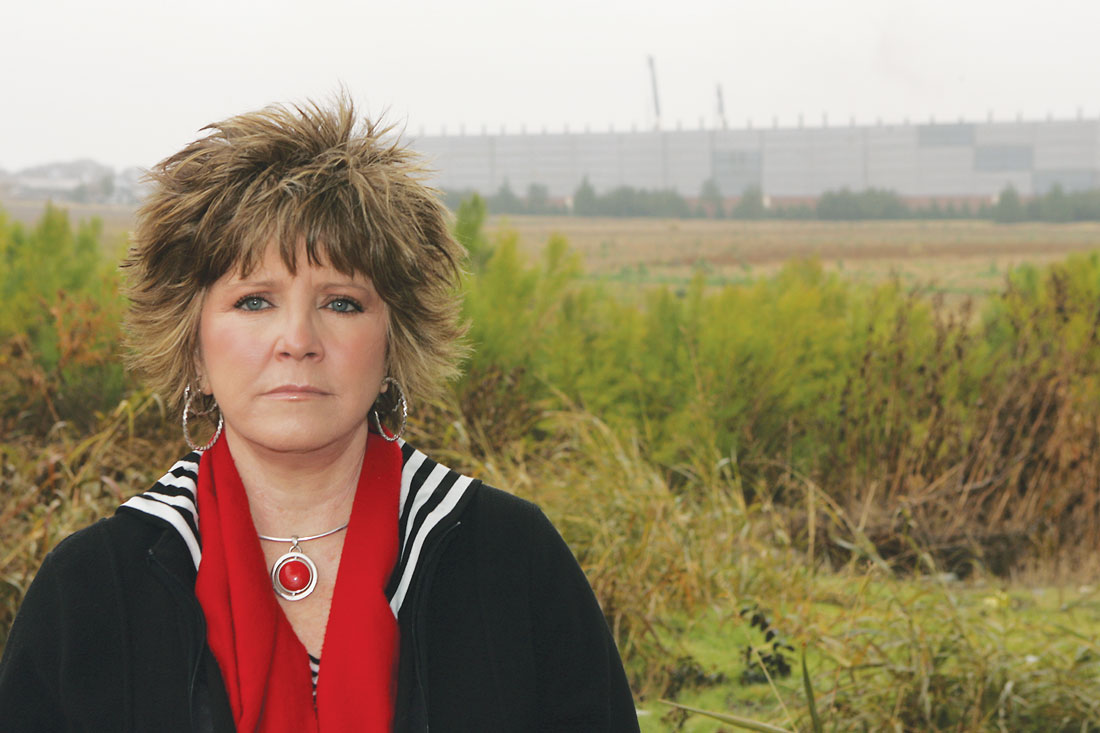Nobody’s really happy.
Not the residents of Mansfield who wanted major changes to the city’s gas- drilling ordinance. And not the industry, whose leaders decided to draw a line in the Barnett Shale sand after suffering a devastating setback several months ago, when Denton decided to ban any further fracking within city limits.
On Monday, Mansfield’s city council unanimously –– with one abstention –– passed a new ordinance with which neither activists or the gas industry is entirely satisfied.
Activists, led by the Mansfield Gas Well Alliance, a group of homeowners in the heavily drilled city, wanted new wells to have setbacks of 1,500 feet from homes and other occupied buildings. Industry fought hard –– and won –– to keep the current 600-foot setback in place, claiming that the distance was sufficient to protect people and property without hindering gas-drilling operations. Mansfield, which currently has a little more than 200 working gas wells, has an additional 300 that have been permitted but not yet drilled. Most of the new ones are on existing pad sites permitted for multiple wells that have not been fully developed. The new setback, had it passed, would not have applied to any of the 300 wells but would have applied to all new well permits.
By a vote of 6-0, the new ordinance passed, but with several minor changes that activists said “were a step in the right direction.”
The changes are numerous.
The Sunday ban on fracking will now include city and federal holidays.
Gas well owners or their representatives will have to meet with Mansfield fire department officials annually to review response plans to emergency situations.
All wells and compressor stations will need to be outfitted with shut-down switches that must be tested by the Mansfield fire marshal annually.
And the city manager can now ask any operator to provide an extended air-quality reading at the site to analyze for poisonous and carcinogenic gases that might be escaping.
“When we approached the city,” said Tamera Bounds, founder of the gas well awareness group, “we were looking for three important things. We wanted a 1,500-foot setback but would have settled for 1,000 feet. We also wanted air monitoring on a consistent basis that was reported to the city, and we wanted the city to look at some of the special use permits that were given to gas well operators, including one that would allow an operator to put 36 gas wells on one site, along with a gas compressor station, a gas dehydrator, separator tanks, and other equipment.”
The site that Bounds is referring to is owned by Edge Resources, a Fort Worth company, and is located on Debbie Lane and Walnut Creek in a part of Mansfield that has grown considerably since the special-use permit was granted in 2008. Though Edge has drilled only two wells on the site, the last in 2010, the company asked the city to reauthorize the permit several months ago.
“We need to reauthorize every five years,” said Mike Martinez, a partner with Edge.
When the city council brought up the reauthorization at a recent meeting, there was a surprising amount of resistance from the public.
“There is a school, homes, and coffee shops in the area now, some as close as 300 feet from the site,” Bounds said. “This was a disaster in waiting.”
At a second hearing on the reauthorization, the council asked Edge leaders if they would abide by any changes in the gas well ordinance. They appeared to agree, but at a third and final hearing in March, the reauthorization was tabled until after the new ordinance was passed.
But the tabling of Edge’s special-use permit, along with the fracking ban in Denton, seemed to rile the industry.
“This is the gas industry’s home,” said Jim Schermbeck, director of Downwinders at Risk, a Dallas environmental group, “and after what happened in Denton, they were not going to let little Mansfield put the clamps on them.”
The industry began a “charm” offensive. Ed Ireland, director of the Barnett Shale Energy Education Council, gave a talk to a luncheon with the Mansfield Chamber of Commerce. XTO Energy’s regulatory affairs manager, Walter Dueease, spoke at a city council meeting. Op-eds began appearing in the Mansfield News-Mirror, part of the Star-Telegram, talking about jobs the industry had created and what was at stake for the people of Mansfield if the new ordinance called for a setback of more than 600 feet. A “push-poll” telephone survey was conducted by Promark Research, a company out of Spring, Tex., in which Mansfield residents were asked whether they thought that Tamera Bounds and her group were trustworthy and whether the city could afford to lose millions of dollars if the setbacks were increased. In March, a new group, Citizens for Mansfield, which supports the gas drilling industry, was formed. In an e-mail, Luke Legate, director of G. Fox Consulting and a lobbyist for the gas and oil industry, noted that “Citizens for Mansfield believes that calls for a 1,500-foot setback for gas wells –– among other excessive regulations –– would hurt [emphasis, Legate’s] Mansfield and threaten private property rights. Our city’s current setbacks are protecting our community without stopping energy and land development.”
It was an enormous effort considering the size of Mansfield and the fact that very little drilling is going on there, said Schermbeck, who thinks Edge was behind it.
Edge’s Martinez said that’s not the case at all.
“In terms of the push-polling, I can tell you we had nothing to do with it,” he said. “We didn’t ask for it, didn’t instigate it, are unaware of the questions that were asked, and we didn’t pay for it. The same goes with the industry people who came to talk to the city and business groups there. They either came on their own, or the city council asked them to come.”
Promark Research did not return phone calls from Fort Worth Weekly.
Martinez does acknowledge that the timing of the industry pushback certainly lends itself to making Edge look culpable, but he thinks it was just circumstance.
“Our reauthorization case came not two months after the Denton fracking ban, and at the same time the council was looking to redo the city gas ordinance,” he said. “Things just culminated at the same time, and while the activity is not due to our case, our case certainly got caught up in it.”
Stephen Lindsay, a former community lobbyist for the energy company Quicksilver Resources and a Mansfield councilperson, claims that the attention received by the ordinance battle was not more than would be expected. “I don’t feel that Mansfield got any more attention than other cities on this issue,” he wrote in an e-mail.
Mansfield’s Mayor David Cook feels similarly: “The industry’s response and interest in what is happening in Mansfield, we believe, stems from the collaborative effort we have put forth as our ordinance undergoes its fourth revision since it was approved in 2008.”
Baloney, said Schermbeck: “The pushback in Mansfield was second only to the industry effort in Denton. Someone paid for that telephone poll. Someone paid lobbyists to come and talk at the three city council hearings and to write those opinion pieces. Industry was not going to lose Mansfield the way they lost Denton.”













The thing about setbacks is that they can be as long as a lateral which is a lot longer than 1,500 feet. So get on the fringe of the city lines at least a lateral’s length away…next, obey the state rule to not drill in densely populated areas and there you have it…Urban drilling should have never been allowed to come in to the towns.TEX LG. CODE ANN. A§ 253.005 : Texas Statutes – Section 253.005: LEASE OF OIL, GAS, OR MINERAL LAND
“(c) A well may not be drilled in the thickly settled part of the municipality..”